

AgBioForum 2(3&4): Ten Reasons Why Biotechnology will not Help the Developing World. Ten Reasons Why Biotechnology Will Not Ensure Food Security, Protect The Environment, And Reduce Poverty In The Developing World Miguel A.
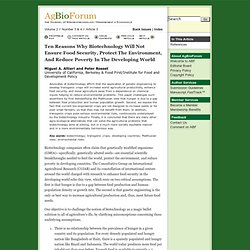
Altieri and Peter Rosset University of California, Berkeley & Food First/Institute for Food and Development Policy Advocates of biotechnology affirm that the application of genetic engineering to develop transgenic crops will increase world agricultural productivity, enhance food security, and move agriculture away from a dependence on chemical inputs helping to reduce environmental problems. This paper challenges such assertions by first demystifying the Malthusian view that hunger is due to a gap between food production and human population growth. The effects of organic agriculture on biodiversity and abundance: a meta-analysis - BENGTSSON - 2005 - Journal of Applied Ecology. Data sources and definitions We investigated the literature published before December 2002 through computer searches on the databases available at the Swedish University of Agricultural Sciences (SLU, Uppsala, Sweden).
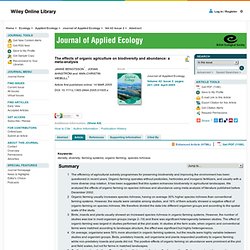
We used the following key-words: biodiversity, biological diversity, conventional farming (agriculture), organic farming (agriculture). We also followed the literature in the field and searched the reference lists of relevant articles. For a study to be included in the analysis, it had to give data on species richness and diversity or abundance at at least a nominal scale. Long-term effects of organic and conventional farming on soil erosion.
Does organic farming reduce environmental impacts? Advantages and Disadvantages Organic Farming: Its Pros and Cons. Advantages and Disadvantages Organic Farming Despite the good things about organic farming why do most farmers still operate by industrialized agriculture?
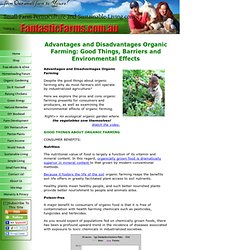
Here we explore the pros and cons organic farming presents for consumers and producers, as well as examining the environmental effects of organic farming. Right>> An ecological organic garden where the vegetables sow themselves! Watch the video. Environmental impact of conventional and organic farming on the land used. Organic Farming Not So Wildlife Friendly, Study Finds. The case for so-called organic farming has always been pretty weak, and a new study in Ecology Letters isn't helping the cause.
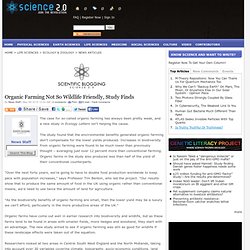
The study found that the environmental benefits generated organic farming don't compensate for the lower yields produced. Increases in biodiversity from organic farming were found to be much lower than previously thought – averaging just over 12 percent more than conventional farming. Environment and Natural Resouces Series No. 4. Organic agriculture and climate change Global climate change is considered one of the most urgent environmental problems.
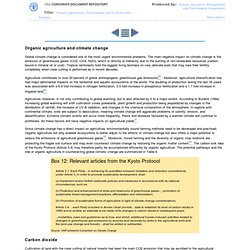
The main negative impact on climate change is the emission of greenhouse gases (CO2, CH4, N2O), which is directly or indirectly due to the burning of non-renewable resources (carbon bound in mineral oil or coal). Tropical rainforests hold the biggest living biomass on very delicate soils that may lose their fertility completely when clear cutting is performed as in recent decades. Organic Farming May Not Be As Beneficial As It Seems. Contrary to popular belief, organic farming may not necessarily be better for the environment. ... to According to a research study out of the United Kingdom's Oxford University, researchers have stated that organic farming has similar benefits as well as similar environmental impacts when compared to conventional farming.
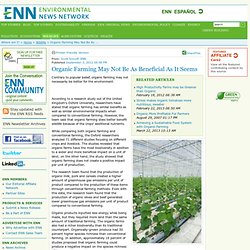
However, the team said that organic farming does better benefit wildlife because of the crops' additional nutrients. The environmental footprint of organic vs. conventional food. Comparing the environmental impacts of two products involves many considerations: chemical runoff into our water supply, soil health and greenhouse gas emissions, to name just a few.
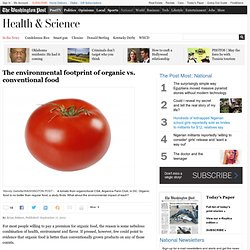
Since there isn’t enough space to consider all of those in a single article, we’ll take one environmental consideration at a time in an occasional series. Land use is a reasonable place to begin. Organic food no more nutritious than conventionally grown food. To many of my friends, buying organic is more than a supermarket choice.
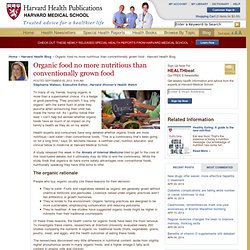
It’s a badge of good parenting. They proclaim “I buy only organic” with the same flush of pride they assume when announcing their child has made the honor roll. Ditccom20032_en. Boom and Bust: the future of our food producing ecosystems – One Billion Hungry: Can We Feed the World? Agriculture food and nutrition for Africa - A resource book for teachers of agriculture. Chapter 2 - Agriculture, food security and nutrition Definitions The food chain: Production-to-consumption linkages Food production, food supply and nutritional status trends in Sub-Saharan Africa.
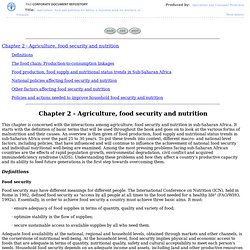
The Organic Myth. Next time you're in the supermarket, stop and take a look at Stonyfield Farm yogurt.
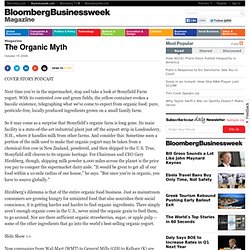
With its contented cow and green fields, the yellow container evokes a bucolic existence, telegraphing what we've come to expect from organic food: pure, pesticide-free, locally produced ingredients grown on a small family farm. So it may come as a surprise that Stonyfield's organic farm is long gone. Organic Agriculture is Booming. Landline - 4/06/00: Health concern drives organic farming boom . Australian Broadcasting Corp. Fertile soil... the market is growing for chemical-free produce. Health concern drives organic farming boom Reporter: Ian Henschke First Published: 4/06/00 Organic farming is now the fastest growing agricultural sector in Australia. Once the province of a few hippies on hobby farms, it has become a multi-million dollar business. Major supermarket chains are now offering organic produce to the public and there are the big export markets opening up in Europe, America and Japan.
The great organic myths: Why organic foods are an indulgence the world can't afford - Green Living - Environment - The Independent. Myth one: Organic farming is good for the environment The study of Life Cycle Assessments (LCAs) for the UK, sponsored by the Department for Environment, Food and Rural Affairs, should concern anyone who buys organic. It shows that milk and dairy production is a major source of greenhouse gas emissions (GHGs).
A litre of organic milk requires 80 per cent more land than conventional milk to produce, has 20 per cent greater global warming potential, releases 60 per cent more nutrients to water sources, and contributes 70 per cent more to acid rain. Also, organically reared cows burp twice as much methane as conventionally reared cattle – and methane is 20 times more powerful a greenhouse gas than CO2. German farmers can′t keep up with organic boom. Organic apples from Argentina, tomatoes from Spain – when looking at the assortment in German organic supermarkets, consumers are easily confused. Even though one might want to make ecologically correct and sustainable decisions when shopping, many of the fruits and vegetables have travelled a long way, leaving a considerable carbon footprint.
German grocers are not just importing the exotic produce such as bananas and mangoes that are impossible to grow in Germany, but also potatoes, apples and cucumbers, as well as pork and dairy products. Organic food industry booming in Brazil. Organic food industry booming in Brazil Send to a friend November 21st, 2012 Brazil’s Ministry of Agricultural Development (MDA) has announced the country’s market for organic products is growing at an annual rate of 15-20%, media organization Agencia Brasil reported. Super foods boom in popularity. CAN I have a green, dairy-free smoothie with a dose of chia seeds, sprinkle of flaxseed, dollop of coconut oil and topped with bee pollen? What might have been an order only overheard in a hippy-laden vegetarian cafe is now becoming a common request in cafes, restaurants and homes across Australia.
Australia's organic and health food movement has been steadily increasing in popularity for a while but the past few years have seen a considerable uptake in a range of strange-sounding seeds, nuts and powders: otherwise known as super foods. No longer are these nuts, grains and foods, suitable for intolerances, contained to the bulk food shelves in health food stores. Organic food boom predicted.
The Truth About Organic Foods - Pros and Cons of Organic Food. Health food boom: Grocers expand choices to meet demand. Organic food. ECONNECT - Supermarkety dovážejí mnoho biopotravin z ciziny. Bio: Zájem veřejnosti roste, stejně jako nabídka - PŘÍRODA.cz. EnviWeb - Trh biopotravin roste každý rok na dvojnásobek. A je to tady, bio BOOM! Biopotraviny a jejich boom.